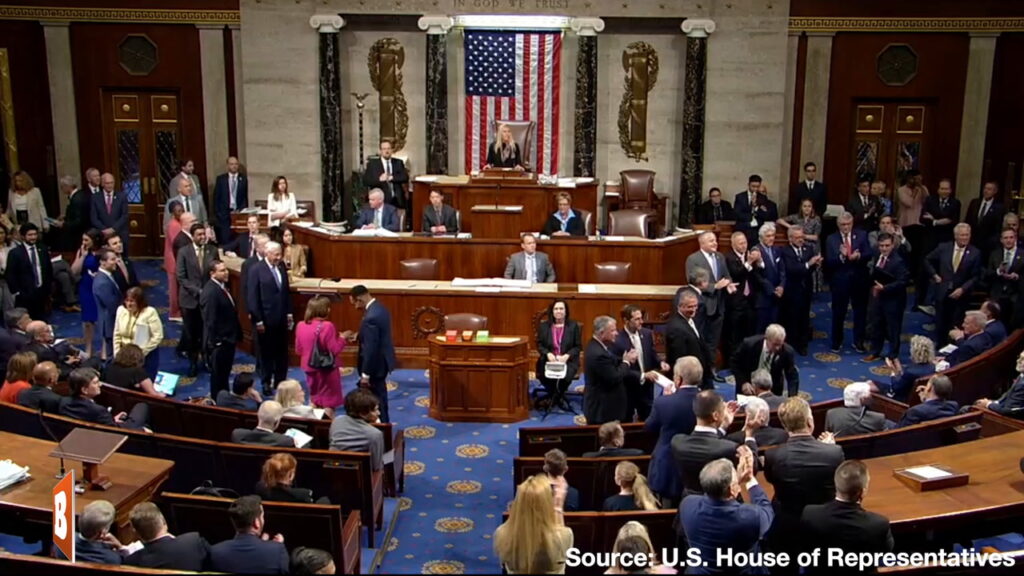
House Speaker Kevin McCarthy (R-CA) is holding fast in negotiations with the White House and Senate Democrats, pushing for deep spending cuts and other key concessions from the left in exchange for lifting the debt ceiling.
The White House attempted to float a freeze on spending at current levels per sources involved in the negotiations, but McCarthy rebuffed the administration’s proposal and is holding out seeking actual cuts to spending levels.
While sources involved say they are unsure at this time exactly how much spending will be cut, some say it could be into the tens of or hundreds of billions of dollars of spending cuts, combined with caps on future years of discretionary non-military spending.
“This is going to be a historic deal,” one key staffer involved in negotiations told Breitbart News.
Other major planks of the emerging deal that McCarthy has insisted on, sources say, include cuts to President Joe Biden’s plans to bring in new IRS agents, which was made as part of the Orwellian-named “Inflation Reduction Act” last Congress. McCarthy, a source familiar with the matter told Breitbart News, has insisted on slashing the hiring of new IRS agents and is demanding that is part of the final deal.
“We know where our differences lie. We worked well into past midnight last night. We’re back at it today trying to get to the conclusion,” McCarthy told reporters Thursday afternoon. “We need to have an agreement that is worthy of the Americans public.”
Work requirements on a variety of entitlement and welfare programs will almost undoubtedly also be part of the deal, and so will rescissions of unspent COVID cash nationwide, sources familiar with the matter say.
All of these provisions, combined with the fact the deal will almost certainly not raise taxes at all, amounts to a major Republican victory — and matches the framework that McCarthy first laid out earlier this spring in a long-form exclusive video interview with Breitbart News.
Matthew Perdie, Jack Knudsen, Zenny Phuong
The White House and Democrats originally insisted on there being no conditions on raising the debt ceiling; they said all year they wanted a “clean” debt ceiling increase and would take nothing but that.
However, as a result of House Republicans passing their own plan out of the chamber, which shocked political observers, the leverage shifted towards the GOP.
Public polling, meanwhile, shows McCarthy’s hand is strong in these negotiations. Clear majorities in most recent polls say Congress should only raise the debt ceiling in exchange for spending cuts, and in most polls, more people say they would blame Biden for a default if one happened than congressional Republicans.
All of that amounts to, as the zero hour fast approaches, Republicans actually using the leverage they have to force the hand of the Democrats — something most conservatives are not accustomed to seeing in the modern era.
Back during the last GOP majority in the House, former Speakers John Boehner and Paul Ryan regularly caved to Democrat demands while sidelining conservative priorities, whereas for years Senate Republicans regularly undercut conservatives handing major consequential legislative victories to Democrats.
But this time around appears to be playing out very differently as almost everyone in Washington underestimated McCarthy: He succeeded in passing a GOP-led plan to raise the debt ceiling and cornered a White House that refused to negotiate at all and now seems poised to close the window on a deal that fits the hallmarks of what Republicans sought entering this process to begin with.
House Majority Leader Steve Scalise (R-LA) said late Thursday afternoon that talks with the White House were moving in a “more positive” direction but caveated that they were “not there yet” in terms of striking a deal.
The majority leader told members they could leave as planned for the Memorial Day weekend and recess but that they would be given 24 hours notice to return to D.C. to vote if and when a deal is sealed in the coming days.
Once that final deal emerges, if it does, then the real work of passing it through both chambers will begin.

House Majority Leader Steve Scalise Tells Lawmakers to Be Prepared for Potential Debt Ceiling Deal over Memorial Day Weekend.
McCarthy will seek to hold as many Republicans on board as he can — he will almost certainly need to get a majority or significantly more than that of House Republicans to vote for it, even though some conservatives will likely criticize it and oppose the final passage.
Some in the House Freedom Caucus, such as Reps. Dan Bishop (R-NC) and Bob Good (R-VA), indicated to Breitbart News that their vote hinged on whether McCarthy would stick to the terms passed in the Limit, Save, Grow Act, a sentiment fellow Freedom Caucus member Rep. Chip Roy (R-TX) laid out in a memo Wednesday morning.
“We’ve got the president and Democrats on the ropes, and we ought not to let them off, and we need to demand the Senate pass our bill,” Good said.
Bishop added that preserving what was passed in the initial bill is the “way to preserve Republican unity,” which, Bishop said, is “the most potent tool that the speaker has … both for this showdown and every other one to come.”
Should McCarthy see defectors from some in his party, Democrats will need to deliver the remaining votes to pass it, and then the plan would need to make it through the Democrat-controlled Senate where Senate Majority Leader Chuck Schumer (D-NY) and Minority Leader Mitch McConnell (R-KY) would both need to deliver a substantial amount of votes for a GOP-crafted plan that gets sign-off from the Biden White House.
Given hard left-wing Democrats in the House are already ripping the White House on this front — people like Rep. Pramila Jayapal (D-WA) have been lambasting the emerging deal — even once a deal is announced, it is no sure thing to get through Congress.




